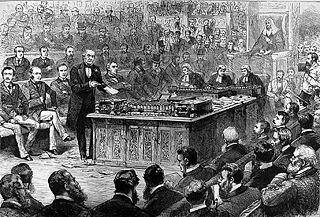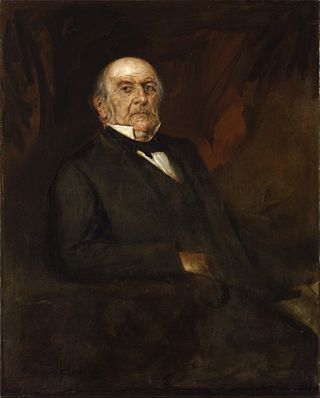Third Gladstone ministry
From Wikipedia, the free encyclopedia
The third Gladstone ministry was one of the shortest-lived ministries in British history. It was led by William Ewart Gladstone of the Liberal Party upon his reappointment as Prime Minister of the United Kingdom by Queen Victoria. It lasted five months until July 1886.
This article relies largely or entirely on a single source. (February 2017) |
Third Gladstone ministry | |
|---|---|
| February–July 1886 | |
 Gladstone (1886) | |
| Date formed | 1 February 1886 |
| Date dissolved | 20 July 1886 |
| People and organisations | |
| Monarch | Victoria |
| Prime Minister | William Ewart Gladstone |
| Total no. of members | 68 appointments |
| Member party | Liberal Party |
| Status in legislature | Minority |
| Opposition party | Conservative Party |
| Opposition leaders | |
| History | |
| Election | 1885 general election |
| Outgoing election | 1886 general election |
| Legislature terms | |
| Predecessor | First Salisbury ministry |
| Successor | Second Salisbury ministry |
Formation
Summarize
Perspective

The Liberal Party under the leadership of William Gladstone came to power in the United Kingdom in February 1886 after they, with the support of the Irish Nationalists, defeated the Conservative government of Lord Salisbury. The ministry was to become one of the most short-lived in British history. Gladstone, aged 76, became Prime Minister of the United Kingdom for the third time. Sir William Vernon Harcourt became Chancellor of the Exchequer, Hugh Childers Home Secretary and future prime minister the Earl of Rosebery Foreign Secretary. Lord Selborne and Sir Henry James both rejected the Lord Chancellorship, a post, which, however, was accepted by Sir Farrer Herschell, who was ennobled as Baron Herschell. Former Foreign Secretary Lord Granville became Secretary of State for the Colonies, while another political veteran, Lord Kimberley, resumed the post of Secretary of State for India which he had held from 1882 to 1885. The influential Joseph Chamberlain was appointed President of the Local Government Board while future party leader and Prime Minister Henry Campbell-Bannerman was made Secretary of State for War. The government also saw John Morley hold his first ministerial post as Chief Secretary for Ireland.
The ministry is chiefly remembered for Gladstone's first attempt to introduce the Home Rule Bill for Ireland. The bill was defeated by a majority of 30 (93 Liberal MP's having voted against it) on 8 June and on 26 June Parliament was dissolved. The issue split the Liberal Party. Lord Hartington, who had refused to serve under Gladstone because of his Irish policies, became leader of the Liberal Unionists. He was joined by Joseph Chamberlain, who had resigned over Home Rule in April.
Fate
The Conservative Party, with the support of the Liberal Unionists, gained a decisive victory in the July 1886 general election, and Lord Salisbury once again became prime minister. The Liberals were to remain out of office until 1892, when Gladstone became prime minister for a fourth time.
Cabinet
Summarize
Perspective
February 1886 to August 1886
| Portfolio | Minister | Took office | Left office |
|---|---|---|---|
| (head of ministry) | 1 February 1886 | 20 July 1886 | |
| Lord Chancellor | 6 February 1886 | 3 August 1886 | |
| Lord President of the Council | 6 February 1886 | 3 August 1886 | |
| Secretary of State for the Home Department | 6 February 1886 | 3 August 1886 | |
| Secretary of State for Foreign Affairs | 6 February 1886 | 3 August 1886 | |
| 6 February 1886 | 3 August 1886 | ||
| Secretary of State for War | 6 February 1886 | 3 August 1886 | |
| Secretary of State for India | 6 February 1886 | 3 August 1886 | |
| Chancellor of the Exchequer | Sir William Harcourt | 6 February 1886 | 3 August 1886 |
| First Lord of the Admiralty | 6 February 1886 | 3 August 1886 | |
| President of the Board of Trade | 6 February 1886 | 3 August 1886 | |
| President of the Local Government Board | 6 February 1886 | 3 April 1886 | |
| 3 April 1886 | 3 August 1886 | ||
| Chief Secretary for Ireland | 6 February 1886 | 3 August 1886 | |
| Secretary for Scotland | 6 February 1886 | 3 April 1886 |
Changes
April 1886: James Stansfeld succeeds Joseph Chamberlain at the Local Government Board. George Otto Trevelyan leaves the Cabinet. His successor as Secretary for Scotland is not in the Cabinet.
List of ministers
Summarize
Perspective
Cabinet members are listed in bold face.
- Notes
References
- C. Cook and B. Keith, British Historical Facts 1830–1900, pp. 38–39.
Wikiwand - on
Seamless Wikipedia browsing. On steroids.
